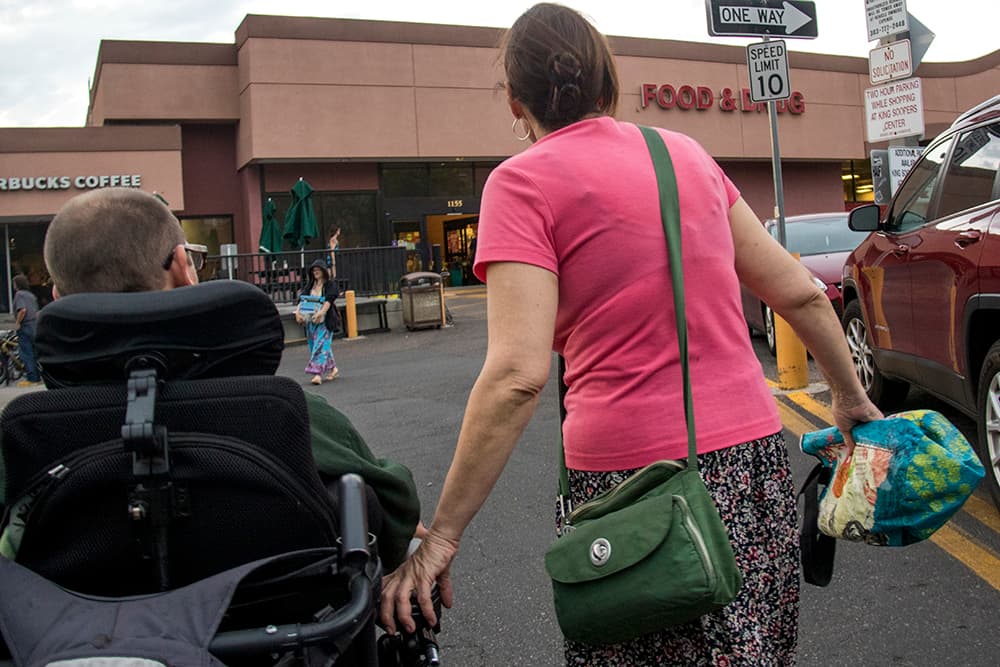
Jennifer Hill knew she might be homeless by the end of the month.
"I had lined up a place with a friend for my cat to go. We had already looked at what shelter options there were," said the 53-year-old nursing assistant, who spends her workday caring for people with disabilities. "I had to find someplace."
In her increasingly desperate search, she tried one last option -- and it exposed her to a world of creeps and grifters, an ecosystem that preys on the lower end of Denver's housing market.
"It was just really, really weird -- probably the weirdest 18 hours of my life," she said.
She knew all the warning signs.
Her search began in July, when her landlord, a family member, suddenly decided to sell the home, she said. It was the kind of unexpected change that she knew could throw people into homelessness.
Her search had cycled past apartments that would cost $1,200 a month even with a roommate. The closest fit she had found to her $15-an-hour wages was a tiny basement room in Arvada for $750 a month, she said. (Read more about her work in our earlier coverage of disability rights.)
Everything was far beyond the $400 and $500 a month situations she'd found after her marriage ended in 2009. The average metro Denver rent has increased by more than 60 percent in the last five years alone. She'd already picked up a second job, but Hill feared she wouldn't find a decent place.
"By the beginning of August, I was realizing, 'I’m not going to find an apartment.'"

Even as she was filing applications for women's shelters, Hill noticed one last option.
She could post her own ad, seeking housing.
"Nursing student seeks room,” she wrote. She included a headshot of herself in her nursing assistant outfit and named the top of her range: $600 a month.
"I posted it on a Wednesday afternoon at one o'clock, and within 15 minutes the phone calls, the text messages and the emails started pouring in," she told Denverite this week. "It was amazing."
At first, it was men offering their couches. What did they want? "You can do the math."
A domestic violence survivor, she knows that abuse is both a cause and immediate effect of housing insecurity. "I see a lot of women out there. The number one reason they’re homeless is usually partner violence, domestic violence, and there were so many predators out there that were absolutely looking for women."
Still, she heard these first offers out, hoping for something decent -- until she realized that they were more interested in talking about their bodies than their houses. "Click, hang up, block," she said of those half-dozen callers.
But the responses kept coming, her phone buzzing until 9 p.m. that night. Some of them were "millennial real estate agents," she said, pushing her toward places in far-south Denver.
Others were offering up houses on Maple Avenue and Poplar Street, places that seemed almost too perfect. And those latter ones seemed to follow a pattern: They listed real Denver addresses, including at least one run by an actual rental company, but the rent was simply too low -- $650 for a two-bedroom, two-bathroom, in one case.

She knew that they were targeting her.
In multiple cases, the "landlords" would claim to be out of the country, with one man claiming to work for the "United Nations Development Program" in Alabama.
"Yes the house is still available for rent and we are looking for a responsible person/family to occupy and maintain the house now that we are not around," wrote "Mr. Alan W. Britnell." (The actual owner of the property told Denverite she doesn't know anyone by that name.)
It was all too elaborate, she knew, but she wanted to believe.
"Immediately, they’d follow up: 'Did you get the link? Did you get the link?'" she said. Ultimately, they wanted personal information -- Social Security numbers, birthdates, the kind of information that an identity thief would use.
When she finally got "Britnell," on the phone, he berated her. "It was a very kind of angry, bullying man," she said. He insisted that she fill out the application before she could see the home.
"At that point, I hung up the phone," Hill said.
This kind of scam isn't uncommon.
"Last year, it was pretty egregious. Those scammers will do anything, and it’s very difficult to catch them," said Maro Casparian, director of consumer protection for the Denver District Attorney's Office.
The temptation of too-low prices is so strong that Casparian, an expert in scams, admitted that she was briefly tempted by a fraudulent listing during her last home search.
"There was this lovely home in Crestmoor for $1,500 a month," Casparian said. "It just was amusing that everybody is susceptible."
In Parker, a business took $350 fees to hold rental properties, but never delivered, according to KDVR. In Denver, a guy named Doug has made a habit of messing with the scourge of scammy rental listers, as 9News reported.
So, what can you do?
- Don't fall for wishful thinking. An eager, persistent landlord with ultra-low rents is probably not legitimate, especially not in this market. If you're really not sure, compare the listing to others in the area and see whether it's close to the average or not.
- Check out the supposed landlord. This can be as simple as a Google search. You also can check county records to ensure they actually own the property in question. Look to see whether the information matches listings on other sites for the same property. Get them on the phone. Visit the property yourself.
- Keep your information to yourself. No landlord should be asking for sensitive information or money before you've visited the property and met them in person. You should be especially wary of people asking you to wire money.
Hill thinks she found the right place.
After filing police reports, she enlisted a friend to continue the search.
"There was no way, after what I experienced, that I was going anywhere by myself," she said.
She's just started moving into her new place: a townhome owned by a man who's also in his 50s. "He's 55, I'm 53. We both got divorced as older adults. I get to practice my Spanish," she said. "I totally lucked out."
She thinks that she narrowly brushed past homelessness, an experience she's already been through.
"When I was homeless 30 years ago, the big thing that I didn’t do was have a big support circle and didn’t ask for help," she said. "I don’t know how people who are isolated or they don’t know the area ... I don’t know how they do it. And you’re vulnerable, and you’re desperate."
For now, she feels a sense of calm as she prepares to start nursing school. She thinks she'll be working long into her 70s -- but if she can use this period of stability to further her education, she's sure she can make it.
If she survived Denver's housing market, she figures, she's ready for anything.
"This situation has shown how resilient and strong I’ve been," she said. "I never believed it, and now I believe it. I believe it."













